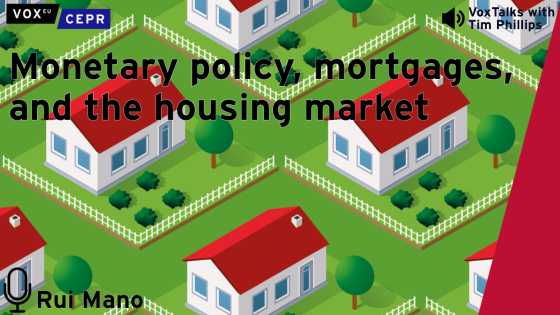According to the IMF, general government debt as a share of GDP will increase in the years encompassing the Global Crisis and the Covid-19 crisis by around 60 percentage points of GDP, from 71% in 2007 to around 132% in 2020 (IMF 2020). Such a large increase in sovereign debt has led some to worry about a possible future loss of inflation-fighting credibility of central banks. The fear is ‘fiscal dominance’ – a situation in which governments continue to pursue very expansionary fiscal policies, despite high levels of total public debt. In this scenario, monetary authorities continue to conduct an accommodative monetary policy, maintaining interest rates low in order to alleviate the public debt burden, resulting in high inflation.
Many economists and central bank watchers counter that central banks are well equipped to deal with a sudden increase in inflation, given their statutory independence and the array of new instruments at their disposal, such as interest on reserves and reverse repos. For example, in a recent speech at the Eurofi meeting in Berlin in mid-September, ECB board member Isabel Schnabel acknowledged the threat of increasing levels of debt to central bank credibility, but argued that fears of fiscal dominance should not concern euro area citizens, arguing that ECB statutory independence protects it against fiscal dominance, and that the evidence, in her reading of it, does not support such concerns (Schnabel 2020).
We agree that for Europe, there is ‘no reason to panic’ about fiscal dominance (Blanchard and Pisany-Ferry 2020). But independently of whether fears of fiscal dominance are warranted or not, we believe there is an additional factor compromising the inflation-fighting credibility of central banks. Since the Global Crisis, many central banks – including the ECB and the Federal Reserve – have pursued policies geared towards supporting asset prices and compressing risk premia. There are several reasons for this. First, by compressing premia central banks try to lower hurdle rates and elicit increases in real investments. Second, monetary authorities are concerned that if asset prices fall, equity in the financial sector may be severely reduced, limiting availability of credit and capital which would again impair economic activity. Third, consumption may fall if financial and housing wealth decrease following an increase in interest rates (a ‘wealth effect’). Finally, central banks themselves may be unwilling to take financial losses in their enormous fixed income portfolios – for instance, the ECB is on track to reach a €7 trillion balance sheet (Ducrozet and Gharbi 2020), equivalent to 60% of the euro area GDP.
Given these policies, it is natural that asset prices are high, interest rates are ultra-low, and all central banks are perceived as ready to intervene to calm markets and remove the left tail of the return distribution. Both effects combine to produce low discount rates and high asset prices even when economic growth remains weak. In addition, the high duration of the assets in this environment of very low interest rates makes asset markets enormously sensitive to any uptick in policy rates and, therefore, more volatile. As a result, the ECB, the Federal Reserve, and other central banks are in a difficult position: they are holding the lion of financial stability by the jaws without being able to let go even when a second lion, inflation, may approach.
Thus, if inflation expectations were to become unanchored, monetary authorities may be slow to respond to preserve financial stability. The alternative, stepping on the brake pedal, can only come at the expense of asset price deflation and increased volatility, which might be worse. In sum, we submit that concerns for asset prices might diminish the willingness of central banks to quash inflation through increases in interest rates.
It is precisely because financial markets ‘understand’ the conundrum faced by central banks that they remain sanguine. In a way, financial markets are excessively stable. Markets ’believe’ in the self-stabilising nature of the current macroeconomic environment as a by-product of monetary policy guided by a stylised macroeconomic model in which financial instability widens the output gap, affects growth prospects by limiting the flow of credit and capital, and is deflationary in nature. Commitment to fight inflation may mean adding to the statutory independence of central banks from fiscal authorities to avoid fiscal dominance, a credible mechanism to guarantee against financial dominance. This is particularly relevant because some of the same fiscally profligate politicians might have an interest in buoyant stock markets and may interfere with the monetary authorities to guarantee elevated valuations supported by unwarranted loose liquidity conditions.
To be clear, we do not believe inflation is a concern at the moment. So far, the pandemic has manifested itself as a negative demand shock of a deflationary nature. But an exogenous shock, say a worsening of the pandemic that creates severe negative supply shocks, or a troubled presidential election in the US, or a sharp post-Covid-19 recovery of economic growth while governments maintain expansionary fiscal policies could unanchor inflation expectations. In that situation, central banks may be slow to respond on account of financial stability concerns unless the proper credible institutional framework is in place.
References
Blanchard, O and J Pisani-Ferry (2020), “Monetisation: Do not panic”, VoxEU.org, 10 April.
Ducrozet, F and N Gharbi (2020), “Perspectives Pictet”.
IMF (2020), “A Crisis Like No Other, An Uncertain Recovery”, World Economic Outlook Update, June 2020.
Schnabel, I (2020), “The shadow of fiscal dominance: Misconceptions, perceptions and perspectives”, Speech at the Eurofi Financial Forum.







